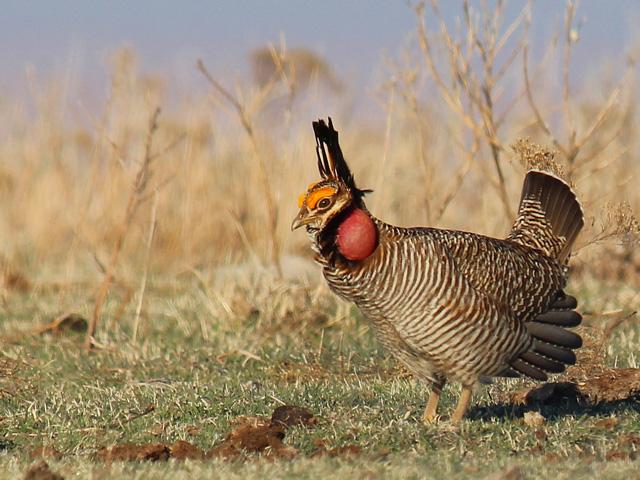Lesser Prairie Chicken Cases in Flux
Kansas Farms Oppose Fed Motion to Delay Lesser Prairie Chicken Lawsuit
LINCOLN, Neb. (DTN) -- With three lawsuits filed all challenging the Biden administration's adding of the lesser prairie chicken to the endangered species list, attorneys for the federal government are trying to have all cases tried in a single court.
Back in July, a group of Kansas farms, ranches and counties filed what was a third lawsuit against U.S. Fish and Wildlife Services, in the U.S. District Court for the District of Kansas.
Last March, two cases were filed in the District Court for the Western District of Texas, one by the Permian Basin Petroleum Association and state cattle organizations, and another by the state of Texas, both challenging the lesser prairie chicken designation.
The two cases in Texas have been combined into one case, and the federal government has motioned the court in Kansas to either transfer that case to the Texas court or delay the Kansas litigation until the Texas cases are resolved.
The Biden administration finalized a rule on Nov. 25, 2022, extending Endangered Species Act protections to what was the threatened Northern distinct population segment of the bird.
Part of the reason the Biden administration wants the cases all tried in the federal court in Texas, is because that court allows federal defendants such as USFWS to file motions for summary judgement.
The court in Kansas does not allow that procedure in a case like this.
In addition, federal attorneys said trying all three cases in Texas will avoid inconsistent rulings on the same issues in different courts.
P[L1] D[0x0] M[300x250] OOP[F] ADUNIT[] T[]
In a court filing on Wednesday, Pacific Legal Foundation attorneys told the federal court in Kansas that the plaintiffs are not opposed to moving the case to Texas.
The Kansas farms, ranches and counties are opposed to indefinitely delaying their case.
"Because a transfer would not prevent the counties and landowners from seeking timely relief, the counties and landowners consent," the groups said in a court document.
"In the alternative, however, the service requests that this court indefinitely stay this proceeding, pending the outcome of the Texas litigation, forcing the counties and landowners to stand aside and place their significant interests in the rule's legality, in the hands of a separate group of litigants who have raised distinct claims. The counties and landowners oppose this alternative request."
The rule finalized the U.S. Fish and Wildlife Service split the lesser prairie chicken into two distinct populations for the first time.
The southern population of lesser prairie chickens is now considered endangered in the southern area, which includes parts of western Texas and eastern New Mexico.
The bird is listed as "threatened" in a larger northern territory that includes eastern Colorado, western Kansas, western Oklahoma and a few counties in the Texas Panhandle.
The Kansas plaintiffs asked the court to set aside the final rule regarding the Northern population group of the lesser prairie chicken and send the rule back to U.S. Fish and Wildlife.
Pacific Legal Foundation filed the Kansas lawsuit on behalf of Lone Butte Farm, LLC, Schilling Land, LLC, and JDC Farms, Inc., as well as the Kansas Natural Resource Coalition. The coalition represents 30 county boards of commissioners in the state.
The Edwards and Schilling families have operated the farms and ranches in western Kansas for generations.
The administration's change on the lesser prairie chicken means livestock producers in parts of five states are required to create grazing plans mainly to protect themselves from conducting activities deemed as harmful to the species.
The Kansas lawsuit outlines how the change in listing of the lesser prairie chicken has affected farms, ranches and counties.
The Lone Butte Farm in Logan County, Kansas, for example, has to take a number of steps to avoid liability for the possible take of the species.
The ranch is required to have a site-specific grazing plan that requires the family to "hire a service-approved consultant to develop a grazing plan before they can run cattle on their property -- leading to significant compliance costs and costly alterations to their operations."
Read more on DTN:
"KS Farms Sue on Lesser Prairie Chicken," https://www.dtnpf.com/…
Todd Neeley can be reached at todd.neeley@dtn.com
Follow him on X, formerly known as Twitter, @DTNeeley
(c) Copyright 2023 DTN, LLC. All rights reserved.



